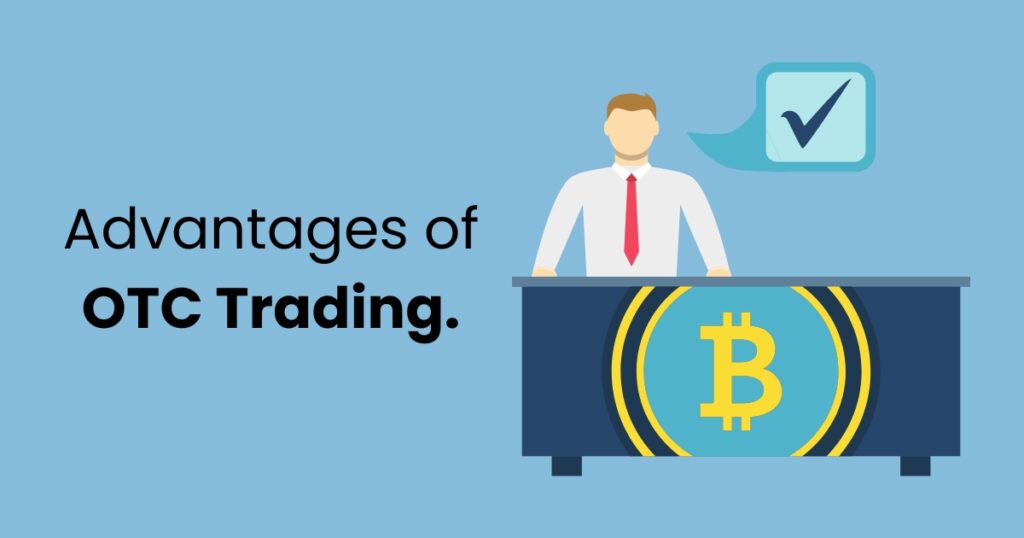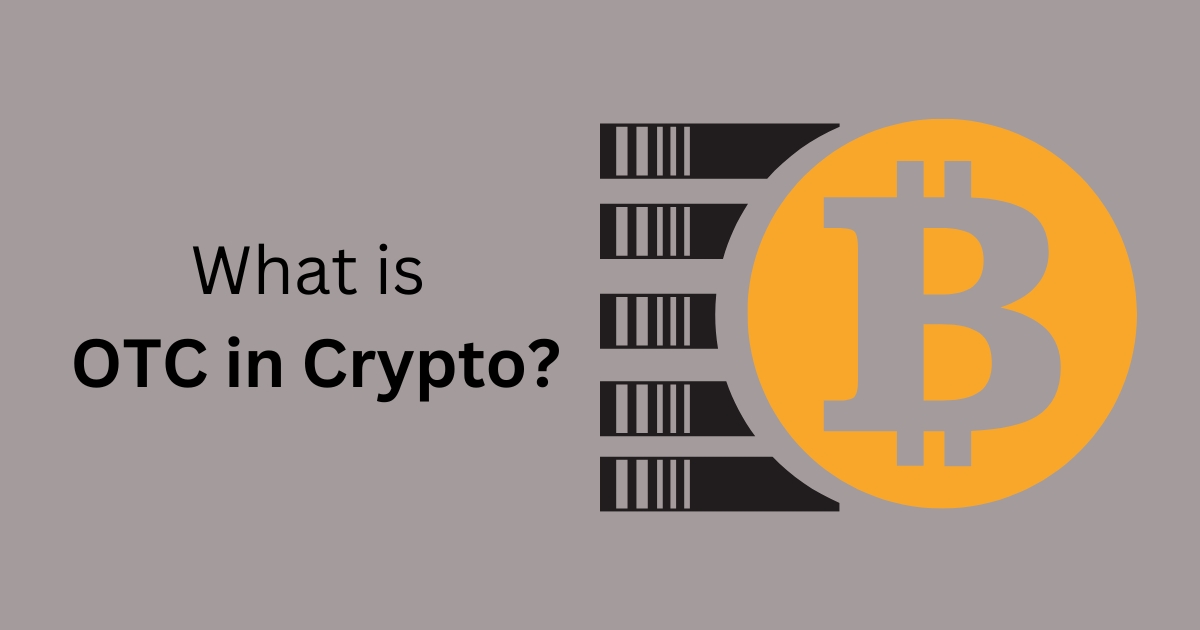Over-the-Counter Trading Explained.
In crypto markets where things are changing so rapidly there exist different strategies for acquiring or shedding digital assets. In these, the most important mechanism is an Over-the-Counter (OTC) trading procedure that allows large-volume transactions to take place. Over the years, OTC trading in cryptocurrency space has gained significant grounds and is seen as a viable alternative to exchanges of yore. However, if that is the case then why OTC in crypto has become so trendy all of a sudden?
The Basics of OTC Trading.
An OTC trade is the direct trading of assets between two parties without having to go through an exchange. OTS stands for over-the-counter, trust me I know you thought it was a typo till now — but here we are! Over-the-counter (OTC) trading has been prevalent in traditional finance for stocks, bonds, and derivatives to enable large institutions to trade huge amounts of assets without significantly affecting the market price. OTC desks help perform buying and selling of large quantities of cryptocurrency by the way generally for institutional investors, high-net-worth individuals or entities looking to trade dead secrets.
How Crypto OTC Trading Operates.
The biggest distinction between OTC and exchange-based trading is that there’s no public order book. This is a similar concept to that of a typical cryptocurrency exchange which shows every buy and sell orders publicly, where prices are automatically matched. Conversely, over-the-counter (OTC) trades are executed directly between the buyer and seller without intermediaries.
OTC desks simply serve as something of a middleman between buyers and sellers, executing the trade. Such desks can either be internal to major financial institutions, dedicated crypto businesses or even standalone operations. In this process, they mean an off-exchange trade executed between buyer and seller as the only 2 trading parties involved in each side of a given volume with OTC desk managing everything — from A to Z logistics-wise all throughout the asset transfer chain.

Advantages of OTC Trading.
Beside the other benefits, doing OTC trading means you can get large trades through without causing massive market noise. A big order on a traditional exchange can cause slippage — the price of an asset changes against the trader because of his or her position size. This is exacerbated in the more illiquid cryptocurrency markets, which can experience a massive move on even minor trades.
OTC trading mitigates that risk by making it possible to perform large trades without drawing attention. Because the transaction is not visible to anybody (really, no one), and you merely project it onto your computer display after everything happens thus there’s no fast reaction on market cost. Due to this, the OTC trading is perfect for institutional investors and high-net-w. Individuals who want to buy or sell a large amount of cryptos without alerting even other market participants to their actions.
Discretion and Privacy.
One of the main advantages is how much privacy OTC trading provides. Even as the virtue of transparency is widely celebrated and much desired, financial transaction privacy continues to be a strong motivator. There are others, for a number of reasons (competitive strategy and regulatory compliance among them), that do not desire to disclose their trade activities. They can execute these trades over-the-counter, and have however their trade typically remains confidential between the two parties.
In the cryptocurrency industry, it is especially useful as market sentiment can be swayed quite dramatically based on these large trades. Traders could prevent panic buying or selling with traders staying out of the public eye which would help preserve market stability.

Liquidity and Flexibility.
OTC trading also has higher liquidity which makes it very flexible. There are traditional exchanges that lack the liquidity to handle a big order without moving prices. OTC desks, meanwhile, can access a wider pool of buyers and sellers that will often lead to better pricing and execution for large trades.
Additionally, OTC desks have the ability to be more flexible with trading terms than exchanges. It enables trading off stock-exchange hours, negotiating terms directly and settling the transactions in local collateral and/or cryptocurrency. The latter is vital for traders who want to make more complex or non-standard trades that might not be possible on a traditional exchange.
Risks & Challenges of OTC Trading.
Great as it sounds, OTC trading in cryptocurrency has indeed some setbacks and risks. Counterparty riskOne of the biggest concerns, and that is what happens if one part of this transaction does not deliver or defaults on their end. As with traditional exchange-based trading, the primary source of trust for an OTC trade would then be based off reliance on third-parties to provide assurances that party A and party B will fulfil their promises.
To alleviate this risk, OTC desks often conduct long and thorough due diligence on both parties involved in the trade as well as a reputable escrow to guarantee any asset is passed between two different people. Nevertheless, the risk is not fully eliminated and you should evaluate how solid your counterparties are before starting with an OTC deal.
Regulatory Considerations.
A second obstacle for OTC trading in the crypto space is an ever-changing regulatory environment. The rules surrounding cryptocurrencies are still somewhat fragmented across the globe, which means that there is a lot of ambiguity for OTC traders because what constitutes illegal activity whilst trading in one country may be perfectly legal in another and vice versa. In some jurisdictions, regulators are also turning the heat up on OTC desks by forcing them to implement rigid AML and KYC protocols.
However, this regulatory scrutiny has a catch twenty-two effect. On the one hand, it strengthens OTC trading: such measures protect participants in this form of market from any criminal intentions within its boundaries. At the same time, however, this could also increase compliance requirements for OTC desks and traders which may slow down transactions or be more expensive.
OTC Trading in the Technology World.
Over the years, technology is assuming a greater significance in OTC trading as display of best prices and liveness has emerged important to this fast changing crypto domain. Nowadays, developers created various platforms and tools to automate the OTC trading process in a more convenient and secure way. For instance, we see the technology now being incorporated in OTC desks by using blockchain to settle trades faster and also reduce counterparty fraud.
OTC trading platforms are also starting to incorporate algo-trading and AI tools that can improve buyer/seller matching and price optimization. This recent technological progress is poised to make OTC trading in the crypto overall area appealing to a wider spectrum of participants.
What Lies Ahead for OTC Trading in Crypto.
Here are some key trends that will likely drive the future of OTC trading on cryptocurrency. The demand for OTC trading services is expected to increase as institutional adoption of cryptocurrency grows. The liquidity and market stability that OTC desks offer is precisely what large financial institutions and corporations desire, as the need for privacy is even more crucial at such levels of trading.
Also, once the regulatory outlook for cryptocurrency becomes clear OTC trading could be standardised and revealed quantifiable. This may ultimately help to build credibility and use-case for OTC markets in the broader crypto infrastructure.
Conclusion.
Nevertheless, the industry should be ready to counterbalance the above mentioned opportunities with the challenges such as the necessity to comply with increased regulation and to accompany technological advancements. OTC desks should remain compliant with the new regulations, invest in the up-to-date technology, and continue to win the confidence of their clients. Conclusion: OTC trading of cryptocurrencies is an important segment of the digital asset industry. It provides a confidential method of conducting large-volume transactions that are difficult to execute using public order book exchanges.
However, OTC trading also has its drawbacks, especially when it comes to the risk of scammers. On the other hand, the advantages of OTC trading for corporate and millionaire traders are significant. As the industry matures, OTC is likely to be more important, bringing liquidity and increasing the adoption of the market. It is therefore important for individual and institutional traders to understand how the OTC segments works.

